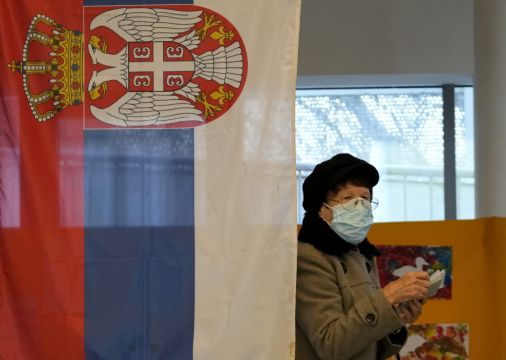Voters in Serbia were casting their ballots on Sunday in a triple election likely to keep in power a populist government in the Balkan country that has refused to impose sanctions on Russia over the war in Ukraine.
Some 6.5 million voters are choosing the president, a new parliament and local authorities in the capital, Belgrade, and more than a dozen other towns and municipalities.
Opinion polls ahead of the vote have predicted that President Aleksandar Vucic will win another five-year term and that his right-wing Serbian Progressive Party will yet again dominate the 250-member assembly.
But analysts say opposition groups stand a chance of winning a majority in Belgrade, which would deal a serious blow to the populists’ decade-old unchallenged rule in Serbia.

Mr Vucic, a former ultranationalist who has boasted of close ties with Russian President Vladimir Putin, has sought to portray himself as a guarantor of stability amid the turmoil raging in Europe.
In a country that went through a series of wars in the 1990s and a Nato bombing in 1999, fears of a conflict spilling over have played into Mr Vucic’s hands.
Though Serbia is formally seeking European Union entry, the president has fostered close ties with Russia and China, counting on the Serbs’ resentment of the West over the Nato air war.
Serbia has supported a UN resolution that condemned the Russian invasion of Ukraine, but Belgrade has not joined the sanctions against Moscow, a historic Slavic ally.
Beleaguered opposition groups have also mostly refrained from publicly advocating a tougher line on Moscow. Russia has supported Serbia’s claim on Kosovo, a former province that declared Western-backed independence in 2008.
After boycotting the previous vote in 2020, main opposition parties have said this vote is also far from free and fair because of Mr Vucic’s domination over the mainstream media and the state institutions.

Mr Vucic’s main opponent in the presidential election comes from a centrist-conservative coalition, United for Victory of Serbia, which comprises the main opposition parties.
General Zdravko Ponos, a Western-educated former army chief of staff, is hoping to push Mr Vucic into a second round in the presidential ballot.
In the run-up to the vote, reports have emerged of ballots being sent to addresses for people who do not live there, prompting opposition warnings of potential fraud.
Ruling populists have denied manipulating ballots or pressuring voters.
Their standing in the capital has been lower than the rest of the country due partly to a number of corruption-plagued construction projects that have devastated the city’s urban core.
A green-left coalition, Moramo, or We Must, is running in the election for the first time, campaigning on the discontent in Belgrade and on anger over Serbia’s numerous environmental problems.
The group has drawn thousands of people to protests against lithium mining in Serbia and to demand cleaner air, rivers and land.

Since his party came to power in 2012, Mr Vucic has served as defence minister, prime minister and president.
On the eve of the election, some voters in Belgrade said they would like to see a change, at least in the capital city. Others were sceptical that this is possible.
”Honestly, I think the opposition stands no chance,” said Srdjan Kovacevic, a resident of Belgrade.
Predrag Rebic said he too expects the central government and the president to remain the same.
“The (Belgrade) mayor will change, that’s what I expect,” he said.







